Swiss referendum: Supporters seek SNB Bitcoin reserves
Swiss advocates propose amending the constitution to include Bitcoin with gold in national reserves, aiming to enhance financial sovereignty and prompt fiscal discussions in Switzerland.
 Alex
Alex
Source: TaxDAO
Colorado, also known as Colorado, is located in the western United States, straddling the eastern Rocky Mountains. It has an area of about 268,000 square kilometers and a population of about 5.77 million (2020), ranking 8th in area and 21st in population among the 50 states in the United States. The capital of the state is Denver, which is also the largest city in the state. Due to its rich natural resources and diversified economic structure, Colorado occupies an important position in the United States.
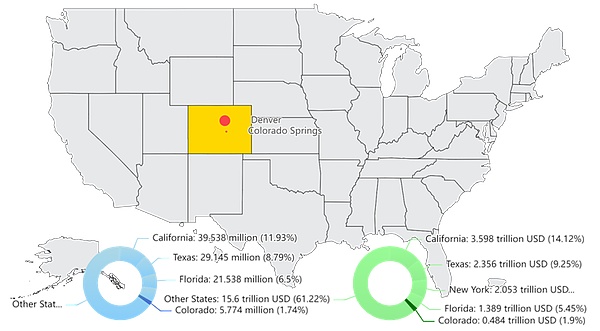
(Chart self-made, data source: Wikipedia Colorado)
In 2022, Colorado's total economy will be about $484 billion, accounting for 1.9% of the US GDP. Colorado's economic development is highly diverse, mainly including six pillar industries: aviation, aerospace, biotechnology, energy, financial services, and information technology software. The state's high-tech industry is very developed, especially in cities such as Denver and Boulder, which have gathered a large number of technological innovation companies such as Oracle, Bloomberg, and Newmont Mining. Colorado is also an important agricultural state in the United States, with major agricultural products including beef, wheat, and corn. In addition, with its famous natural landscapes such as the Rocky Mountains, Colorado has become a world-renowned tourist destination, attracting millions of tourists every year.
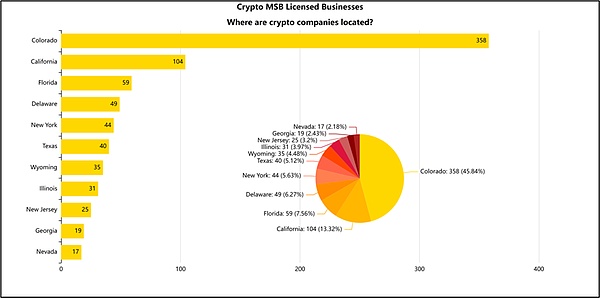
(Chart self-made, data source: FinCEN Cryptocurrency Business Registration)
Whether in terms of area, population or economic output, Colorado is a relatively small state in the United States, but the state's position in cryptocurrency activities is extremely important. According to data from the Financial Crimes Enforcement Network (FinCEN), Colorado's registered cryptocurrency companies account for about 33% of all registered cryptocurrency companies in the United States. From an analytical point of view, this phenomenon is mainly due to Colorado's active policy support, relaxed regulatory environment, and advantages in energy and industry, among which the help of key figures is also indispensable. Next, we will analyze in detail Colorado's specific performance in these aspects and how it has promoted the state to become an important center for the cryptocurrency industry.
Colorado's tax system is characterized by simplicity and uniformity. Compared with the complex progressive tax system in some states, Colorado adopts a single tax rate, which is consistent for both individuals and businesses, making Colorado's tax system simple and transparent. Overall, Colorado's tax burden is at a medium-to-low level, especially in terms of income tax and sales tax, which are competitive nationwide.
2.1 Taxes and tax rates
There are currently 11 major tax categories on the Colorado official website, such as income tax, land tax, sales and use tax, etc. Some tax categories and tax rates are summarized as follows:
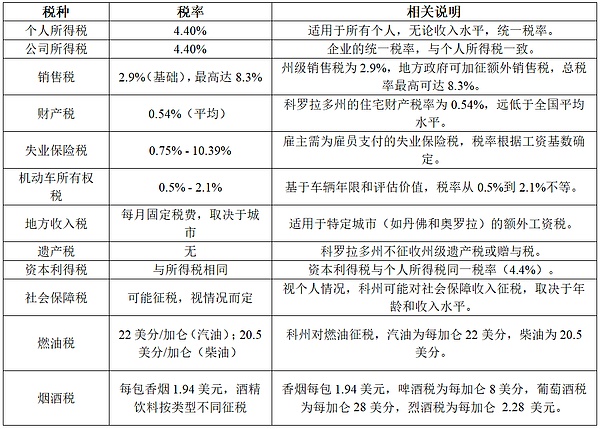
2.2 Taxpayers
Under Colorado's tax system, taxpayers include individuals, businesses and other legal entities, and the tax burden is reflected in many aspects.
Individuals in Colorado are required to pay a state-level personal income tax of 4.4%, which is a uniform tax rate in Colorado and applies to individuals of all income levels. In addition, individuals are subject to a state sales tax when they purchase goods and certain services. The base tax rate is 2.9%, and local governments can levy additional surcharges, bringing the total sales tax rate to 7.78% in some areas. If an individual owns real property (such as a residential or commercial property), they are subject to property taxes levied by local governments. The average property tax rate in Colorado in 2023 is about 0.54%, which is relatively low compared to the national level.
For businesses, Colorado imposes the same 4.4% unified income tax as individuals, and this tax rate applies to businesses regardless of size or income. In addition, businesses are required to collect and remit sales taxes on the sale of goods and services, which applies to most physical goods and some digital goods (such as software, online services, etc.). Colorado also imposes a motor vehicle ownership tax on corporate vehicles, with the tax rate adjusted based on the age and assessed value of the vehicle. Although Colorado does not have a franchise tax or similar corporate tax other than corporate income tax, businesses are still required to report their income and sales taxes to ensure compliance with the law.
2.3 Taxable Objects
Colorado’s taxable objects cover goods, services, capital gains and specific industries, and the types of taxes are relatively wide. Individual and corporate income, commodity sales, real estate, movable property, specific services, etc. are all included in the tax system, forming a relatively comprehensive tax collection framework. In this system, local taxes are combined with state taxes to ensure that taxes on different economic activities and industries are reasonably distributed, and the tax burden on enterprises and individuals is relatively balanced.
Commodities: Colorado imposes sales tax on most tangible goods, with a state tax rate of 2.9%, one of the lowest basic tax rates in the United States. Item taxation includes common commodities such as daily consumer goods and clothing. In addition, local governments can impose additional tax rates, bringing the total sales tax rate in some areas to 7.78%. Colorado’s property tax targets real estate of individuals and businesses, including residential, commercial properties and vacant land. The average property tax rate in 2023 is about 0.54%.
Services: While many services are not taxable in Colorado, some are still taxable. Taxable services include repair services, digital services (such as software subscriptions, streaming services), entertainment services, and cable TV services. In addition, as the digital economy expands, Colorado is taxing more and more virtual goods and services, such as cloud computing services and other online platform services. For businesses that provide taxable services, they must collect and remit sales tax on their behalf to ensure compliance with state regulations.
Capital Gains: Colorado taxes income and capital gains for individuals and businesses at a uniform rate of 4.4%. Wages, salaries, interest income, and dividend income for individuals, as well as business income for businesses, are taxable capital gains. Capital gains (such as gains from the sale of assets such as stocks and real estate) are also taxed at the same rate as personal income taxes.
Personal Property and Transportation: Colorado imposes a motor vehicle ownership tax on vehicles owned by individuals and businesses.
Specified consumer goods: Colorado imposes special consumption taxes on certain specific consumer goods, such as fuel, tobacco, and alcohol.
2.4 Tax incentives
According to the official website, Colorado has a lot of tax incentives, totaling 24 categories. As a state with a low tax burden, Colorado uses a series of incentives to attract investors and residents and create a favorable operating environment for enterprises. These include advanced industry investment tax credits, employee stock ownership tax credits, enterprise zone contribution tax credits, personal benefit tax credits, etc.
2.4.1 Tax incentives for enterprises
For enterprises, Colorado provides many incentives, covering capital investment, R&D innovation, and industry-specific tax credits. First, Colorado's Enterprise Zone Program provides important tax incentives for enterprises investing in economically underdeveloped areas. Enterprises can enjoy sales tax rebates, equipment purchase exemptions, and other investment tax credits by expanding capital investment and hiring new employees in these areas.
Colorado also has significant tax incentives for renewable energy projects and R&D activities. If companies invest in renewable energy such as wind and solar energy, they can enjoy tax breaks for equipment purchase and installation, greatly reducing initial costs. For R&D companies, the state government provides R&D tax credits to support companies' investment in technological innovation and high-tech fields. These tax credits encourage companies to set up R&D centers in Colorado and promote the development of green energy and high-tech industries.
To further support technological innovation, Colorado has also established the Advanced Industries Accelerator Program. The fund provides direct financial support and tax incentives to companies in aerospace, medical equipment, energy technology and other fields. Through this fund, companies can obtain R&D funds and enjoy tax breaks, especially in promoting cutting-edge technology and innovative product development.
In addition, Colorado provides capital investment incentives for capital-intensive investments. Companies that make long-term capital investments in the state, such as building new plants or expanding production lines, can obtain corresponding investment tax breaks.
2.4.2 Tax incentives for individuals
Colorado also offers a variety of tax incentives for individuals. First, Colorado's flat income tax rate is 4.4%, which is relatively low and simple. It applies to residents and non-residents of all income levels, reducing the tax burden on individuals. In addition, Colorado provides partial exemptions for social security income. Individuals aged 55 to 65 can be exempted from $20,000 in social security income, and individuals aged 65 and over can enjoy complete tax exemption. This policy is particularly attractive to retirees and elderly residents, reducing their tax pressure.
Colorado also provides property tax exemptions for specific groups, especially the elderly and disabled. Eligible residents can apply for property tax refunds to help them reduce the financial burden of property holdings.
According to a 2023 report on business location selection by Business Facility, Colorado ranks second in "green jobs", and only sixth in "best business environment" and "technical talent". In addition, "best business tax environment" and "professional workforce training" are not even on the list. From the overall tax environment, Colorado does not seem to have a low tax rate like Texas. Why is the state so attractive to registered money service businesses (MSBs)?
Colorado has been a leader in creating a crypto-friendly legal framework, which may explain the state's appeal to MSBs. The state introduced the Digital Token Act, which provides certain state securities law exemptions for cryptocurrencies, which may make it easier for blockchain and cryptocurrency-focused businesses to operate. Below we will introduce the state's taxation and regulation of the crypto industry in more detail.
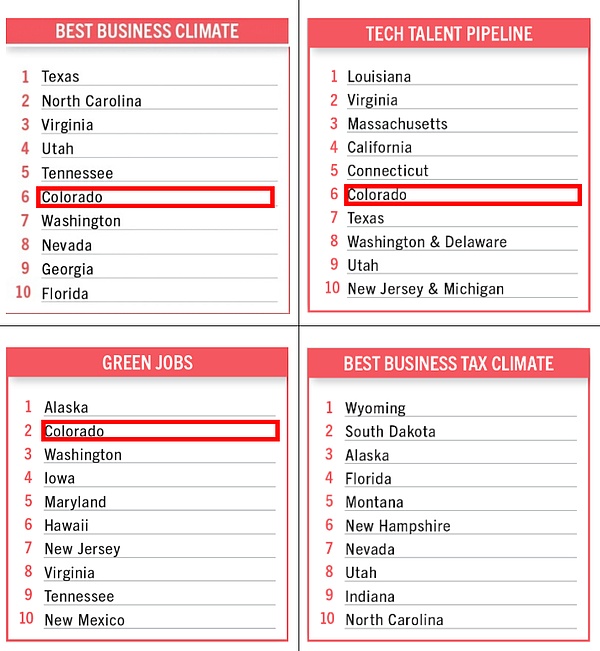
(Chart source: Business Facilities’ 19th Annual Rankings Report: State Rankings)
Before introducing Colorado’s cryptocurrency taxation and regulatory framework, we must first mention Governor Jared Polis. He was elected Governor of Colorado in November 2018 and was officially sworn in in January 2019. He has been re-elected to date. He is an important example of a technology entrepreneur entering politics. Polis has shown a strong interest in cryptocurrency and blockchain technology during his tenure as a member of Congress and became a co-founder of the Congressional Blockchain Caucus. He is committed to making Colorado a center of blockchain innovation. As early as during the campaign, he publicly and clearly put forward five policy goals, including: promoting the widespread application of blockchain in business and government, developing blockchain infrastructure for election security, simplifying government services, and providing legal and financial framework support for crypto companies. Among them, the Digital Token Act, which he insisted on, further provided a broader entrepreneurial environment for cryptocurrency companies by relaxing securities law regulations on certain tokens.
He is also committed to making Colorado the first state in the United States to accept cryptocurrency to pay state taxes. His goal is not limited to this. He also suggested allowing the use of cryptocurrency to pay for services such as driver's licenses and hunting. We have reason to believe that Colorado can quickly become the forefront of blockchain innovation in the United States, which is inseparable from his election and promotion.
3.1 Taxation of Crypto Assets
3.1.1 Definition
Colorado does not have a special tax specifically for crypto assets in the taxation of cryptocurrencies. Consistent with the policy of the US federal government, Colorado treats cryptocurrencies as property, which is subject to tax rules similar to capital assets such as stocks and real estate. Therefore, when it comes to cryptocurrency transactions or sales, individuals and companies must declare capital gains tax or capital losses, rather than declaring them under other taxes. Capital gains tax on cryptocurrencies is divided into long-term capital gains and short-term capital gains according to the holding period, and different tax rates apply to each, with short-term tax rates being higher and long-term tax rates being relatively lower.
3.1.2 Taxes and Tax Rates on Crypto Assets
The lack of special taxes specifically for crypto assets means that Colorado's taxation of crypto assets is based on the basic tax system.
Capital Gains Tax: If cryptocurrencies are held for less than one year, the gains are considered short-term capital gains and are taxed at the ordinary income tax rate for individuals or companies. Colorado's ordinary income tax rate for individuals is 4.4%, and the federal tax rate is tiered based on individual income, up to 37%. If cryptocurrencies are held for more than one year, long-term capital gains tax applies. The federal tax rate for long-term capital gains is 0%, 15%, or 20%, also depending on the taxpayer's income level. Long-term capital gains tax rates are generally lower than short-term capital gains tax rates, which encourages investors to hold cryptocurrencies for the long term.
Sales Tax: In Colorado, when cryptocurrency is used to trade for goods or services, it is treated just like legal tender. Merchants who accept cryptocurrency payments must report the transaction amount at the equivalent exchange rate in U.S. dollars and pay the corresponding sales tax. The base state sales tax rate is 2.9%, but with the addition of local taxes (such as municipal and county taxes), the actual total tax rate can reach 7% to 11%. Therefore, using cryptocurrency to purchase goods or services in daily consumption does not exempt you from paying sales tax. Similarly, buying and selling cryptocurrencies as commodities is also subject to sales tax.
Paying taxes: Colorado is the first state in the U.S. to allow residents and businesses to pay state taxes with cryptocurrency. Starting in 2022, individuals and businesses can use cryptocurrencies such as Bitcoin and Ethereum to pay personal income taxes, corporate taxes, and other taxes through third-party platforms. These cryptocurrencies will be instantly converted to U.S. dollars through payment processors, and the state government will not directly hold the cryptocurrencies. This policy reduces transaction costs while providing cryptocurrency users with more payment options.
Business tax: When a business conducts cryptocurrency-related business in Colorado, its profits are subject to state and federal business tax policies. For corporate income, Colorado's corporate income tax rate is 4.4%, which is consistent with the tax rate applicable to ordinary businesses. Whether a business makes money through cryptocurrency exchanges, mining, or other related businesses, it will eventually pay business tax on the corresponding corporate income.
For individual miners or independent cryptocurrency service providers, Colorado requires income reporting and tax payment according to various tax regulations. First, the cryptocurrency income obtained by an individual through mining will be considered taxable income, which is estimated based on the market value of the cryptocurrency at the time of mining. This part of income is subject to Colorado's personal income tax at a rate of 4.4%. At the federal level, this part of income is also subject to federal income tax based on the size of the income. In addition, if an individual sells or trades the cryptocurrency obtained through mining, the capital gains will be subject to capital gains tax.
In addition, individual miners or self-employed cryptocurrency practitioners are also subject to self-employment taxes, which include social security taxes and Medicare taxes, with a total tax rate of 15.3%. This tax burden is particularly important for those who earn income from mining or blockchain services. If an individual miner or independent practitioner is a large-scale operation and employs employees, there are also payroll taxes to consider, including Social Security and Medicare taxes at the federal and state levels, as well as personal income tax withholding.
For cryptocurrency mining companies or blockchain service companies, tax responsibilities are more diverse. The company's profits are subject to Colorado corporate income tax, and the company's profits from the sale of cryptocurrency after generating income through mining or blockchain services are also subject to capital gains tax. Similarly, if the company uses imported equipment or equipment purchased from other states to mine or provide services, and does not pay local sales tax, the company will need to pay excise tax. Excise tax rates vary by region, generally ranging from 7% to 11%. Businesses that provide digital services or cryptocurrency trading platforms may need to collect sales tax on their service income, especially for consumers within Colorado.
3.1.3 Tax Incentives
Based on IMF statistical analysis, by 2022, crypto mining and data centers will account for 2% of global electricity demand. This proportion may rise to 3.5% within three years, equivalent to the current electricity consumption of Japan, the world's fifth largest electricity user.

(Chart self-made, original image: Chart of the Week, MACRO-FISCAL POLICY Carbon Emissions from Al and Crypto AreSurging and Tax Policy Can Help)
Cryptocurrency mining and blockchain technology are highly dependent on data centers and a large amount of energy. Like quantum computing and AI, they are industries with extremely high demand for electricity and computing resources. As a potential technology center in the United States, Colorado has shown strong support for the high-tech industry. For example, in the field of quantum technology, the governor of Colorado announced a series of new tax credit incentives at the Mountain West Quantum Ascension Summit in Denver, such as tax credits for purchasing equipment and establishing next-generation computing laboratories, and the establishment of a loan guarantee program to help start-ups obtain funds, aiming to attract quantum technology companies to settle in.
Similarly, the crypto asset industry can take advantage of local tax incentives when developing in Colorado-although this policy is not entirely targeted at the cryptocurrency industry. For crypto asset miners and companies, the following tax incentives need to be noted:
Property tax exemption: According to Section 30-11-132 of the Colorado Local Government Code, local governments can encourage companies to make long-term capital investments in specific areas by providing property tax exemptions or refunds. Cryptocurrency mining companies are such capital-intensive projects because they rely on large-scale data centers for high-intensity computing. By signing an agreement with the local government, these companies can obtain property tax exemptions for up to 10 years. Generally, these exemption policies apply to investment projects identified as "Area of Specific Local Concern" and are intended to promote local economic development.
R&D Expense Credit: Colorado Revised Statute §31-20-101.7 provides an important tax incentive for companies engaged in technological innovation. The policy allows companies to deduct 25% of their R&D expenses from their state taxes. This is particularly important for the cryptocurrency industry, especially companies that are committed to developing new blockchain applications, improving mining efficiency, and optimizing encryption algorithms. By applying for R&D tax credits, cryptocurrency companies can deduct part of their expenses for technology research and development from taxes, reducing the financial burden of the company.
Pay taxes with cryptocurrency: Colorado has become the first state in the United States to allow taxpayers to pay state taxes with cryptocurrency. Although this does not directly reduce taxes, the use of cryptocurrency payments can provide more tax payment convenience for companies whose main wealth is digital assets. This applies to various taxes such as income tax, sales tax, and use tax.
3.2 Crypto-asset regulation
3.2.1 Development history
Compared with Colorado's tax policy, its extensive regulatory system and open and innovative business environment are more attractive to cryptocurrency companies. Colorado's regulatory changes on cryptocurrencies have gone through the following periods:
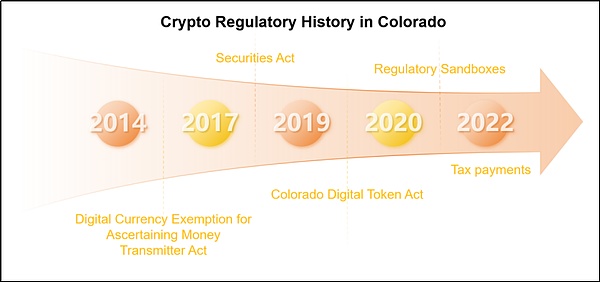
(self-made chart, content: Development history of Colorado's crypto-regulatory events)
As early as 2014, Colorado passed the Digital Currency Exemption Act for Determining Money Transmission, which stipulates that companies that only handle digital currencies (such as Bitcoin) do not need to apply for a money transmission license. However, if a company also handles traditional currencies or acts as an intermediary between buyers and sellers of digital currencies, it must obtain a money transmission license.
Colorado began to focus on the legal framework for cryptocurrencies in 2017, when the state government first considered cryptocurrencies as a commodity and regulated them in the Colorado Securities Act. At this time, the state required all businesses engaged in the sale, purchase or transfer of cryptocurrencies to obtain a money transmission license to ensure that these businesses comply with federal regulations such as anti-money laundering (AML) and know your customer (KYC).
In 2018, the Colorado Securities Division issued guidance on how existing securities laws apply to cryptocurrency offerings. Companies and individuals offering cryptocurrency investments in Colorado must comply with state securities registration requirements and disclose all relevant information to potential investors.
In 2019, Colorado passed the landmark Colorado Digital Token Act, which exempted certain crypto tokens from securities registration and broker license requirements. This provides a more relaxed environment for blockchain and cryptocurrency startups and promotes the development of the industry. It aims to promote innovative applications of blockchain technology and clarify the regulatory scope of digital assets.
In 2020, Colorado established a fintech sandbox program, allowing cryptocurrency companies to test new products and services in a controlled regulatory environment. This not only provides more room for innovation for cryptocurrency and blockchain companies, but also ensures that companies can develop under supervision and avoid heavy regulatory burdens.
Starting in 2022, businesses and individuals can use cryptocurrencies to pay state taxes, including income tax and sales tax. This policy marks a unique breakthrough in the state's acceptance of cryptocurrencies across the United States, and more businesses and individuals are encouraged to use digital currencies within a legal framework.
It is not difficult to see that Colorado's regulation of the crypto industry is positive and progressive. We have reason to believe that Colorado's legal provisions will continue to be updated in the future, and the regulatory environment and the use of cryptocurrencies will continue to improve.
3.2.2 Regulatory bodies
Colorado's cryptocurrency regulatory framework is mainly based on state laws and regulations and guidance from federal agencies such as the Internal Revenue Service (IRS) and the Securities and Exchange Commission (SEC).
Its main features include:
Money Transmitter Act: Any person or entity engaged in money transmission (including the transmission of virtual currency) must be licensed by the Colorado Banking Department.
Check Sales Act: The sale or issuance of monetary instruments such as cryptocurrencies must comply with sales laws) The Uniform Electronic Transactions Act (UETA, which recognizes electronic signatures and records, which can include transactions involving digital assets.
Colorado Securities Act: The sale or issuance of securities (including certain types of cryptocurrencies) must comply with the Act and register with the Colorado Securities Commissioner or obtain an exemption.
Digital Token Act and its amendments: Exempt certain digital tokens from the state's securities laws and regulations, making it easier for companies to raise funds through initial coin offerings (ICOs) or other digital token issuances; Senate bill 20-109 adds additional consumer protections, requiring businesses seeking exemptions under the act to disclose their token offerings and file annual reports with the Colorado Securities Commissioner
as well as Securities Department guidance, IRS guidance, Securities and Exchange Commission guidance, etc.
Colorado has not yet developed a comprehensive regulatory framework specifically for cryptocurrencies. But existing state laws and federal guidance play an important role in regulating the state's cryptocurrency industry. Among the government agencies that play a role:
Colorado Department of Securities: The Department of Securities is responsible for regulating the sale and issuance of securities, which includes certain types of cryptocurrencies.
Colorado Department of Regulatory Agencies (DORA): DORA Regulates various industries in the state and designates the Securities Department as responsible for regulating cryptocurrency activities.
Colorado Department of Revenue: The Department of Revenue administers and enforces taxes, including income taxes on cryptocurrency transactions.
Colorado Banking Commission: The State Banking Commission regulates and oversees state-chartered banks, trust companies, and other financial institutions that deal in virtual currencies.
Department of Banking: As part of DORA, the Department of Banking regulates state-chartered credit unions and trust companies that provide virtual currency exchange services.
Office of the Attorney General—Consumer Protection Section: The Consumer Protection Section investigates complaints related to fraudulent or deceptive practices involving virtual currencies.
3.2.3 Regulated Objects
Under Colorado's increasingly improved regulatory system, the regulated objects are more diverse, including:
Cryptocurrency Exchanges and Wallet Service Providers: Platforms help users buy, sell, and store cryptocurrencies. Under federal regulations and Colorado law, exchanges must comply with money transmission laws and obtain money transmission licenses. These businesses need AML and KYC regulations to ensure that transactions are legal and compliant.
Digital Token Issuers: Under the Digital Token Act, businesses that issue digital tokens can be exempted from some securities laws when their tokens are used for consumption (rather than investment), but are still subject to basic anti-fraud laws. Such businesses need to ensure that the token issuance does not involve investment fraud and complies with relevant consumer protection laws at the time of issuance.
Cryptocurrency Miners and Mining Facilities: Mining companies are directly regulated by securities or financial regulations when trading crypto assets, and due to their high energy consumption characteristics, crypto mining farms are indirectly regulated by state energy policies and environmental regulations. Mining farms must comply with relevant business and tax regulations to ensure legal and compliant operations.
Fintech and Blockchain Startups: In Colorado, many fintech companies use blockchain technology to innovate. Companies participating in the fintech sandbox program test new technologies and products with less regulation, which provides regulatory support and innovation space for cryptocurrency-related startups, but they must also comply with basic consumer protection and privacy regulations.
Individual or institutional users: Individuals and institutions that trade cryptocurrencies, especially investment-related transactions, need to declare capital gains tax or other related taxes at the state or federal level.
Colorado has become a leader in the cryptocurrency field in the United States with its open policies and regulatory framework. The state has effectively reduced the operating costs of high-tech companies, including cryptocurrency companies, through flexible property tax exemptions, research and development tax credits, and equipment investment incentives, and has provided substantial support for capital-intensive and energy-intensive mining activities. In addition, laws such as the Digital Token Act simplify compliance procedures, provide compliance guidance, and encourage innovative development. The regulatory system covers a wide range, from exchanges to mining companies, ensuring the standardized operation of the crypto ecosystem.
As the blockchain and cryptocurrency markets continue to expand, Colorado is expected to continue to play its innovative leadership. In the future, Colorado may attract more world-leading crypto companies to settle in by expanding tax incentives and optimizing the fintech sandbox program. At the same time, as energy use and environmental protection requirements increase, Colorado may promote more green energy incentives for high-energy mining companies to balance industry growth with environmental responsibility. This will further consolidate its national leading position in the field of blockchain and crypto assets.
Swiss advocates propose amending the constitution to include Bitcoin with gold in national reserves, aiming to enhance financial sovereignty and prompt fiscal discussions in Switzerland.
 Alex
AlexThe New York Stock Exchange (NYSE) is conducting a market survey on 24-hour trading, partly due to the increase in activities from Bitcoin and retail investors.
 Miyuki
MiyukiAmid escalating geopolitical tensions across various regions globally, renowned investor and author of "Rich Dad Poor Dad," Robert Kiyosaki, believes this could lead to another world war, with Bitcoin likely to perform well. This acclaimed author has long recommended gold, silver, and Bitcoin.
 Weiliang
WeiliangThe IRS has released a draft 1099-DA tax form, which experts warn will allow for large-scale collection of Bitcoin trader identities and transfer data from encrypted wallet addresses.
 Alex
AlexAccording to an unaudited report, Animoca Brands reportedly holds $291 million in cash and stablecoins.
 Kikyo
KikyoThe recent Bitcoin halving has sparked optimism among analysts, with predictions suggesting prices could reach as high as $4.5 million per coin, driven by limited supply and growing institutional interest. Bitcoin's potential as a sustainable mega-asset, supported by institutional investment and a narrative shift towards environmental friendliness, signifies a bold new era for the cryptocurrency.
 Weatherly
WeatherlyThailand tightens controls on unlicensed crypto exchanges to combat financial crimes, urging public to withdraw funds and verify platform licenses to enhance safety and compliance.
 Miyuki
MiyukiAs funds continue to flow out for the second consecutive week, global cryptocurrency funds are experiencing market uncertainty. Investors are worried about the long-term implementation of the Federal Reserve's high-interest rate policy, leading to decreased demand for cryptocurrency ETFs. Particularly in the U.S., ETFs suffered a withdrawal of $244 million.
 Alex
AlexGeoff Kendrick, Head of Digital Asset Research at Standard Chartered, stated that due to the bullish setup of cryptocurrencies, Bitcoin's price could still more than double this year. Kendrick reaffirmed the company's price target of $150,000 during an interview with BNN Bloomberg last week, indicating a 127% increase in Bitcoin by the end of this year.
 Miyuki
MiyukiProminent cryptocurrency founder MaxBecauseBTC predicts a bullish future for Dogecoin, which could potentially lead to increases in other altcoins.
 Weiliang
Weiliang